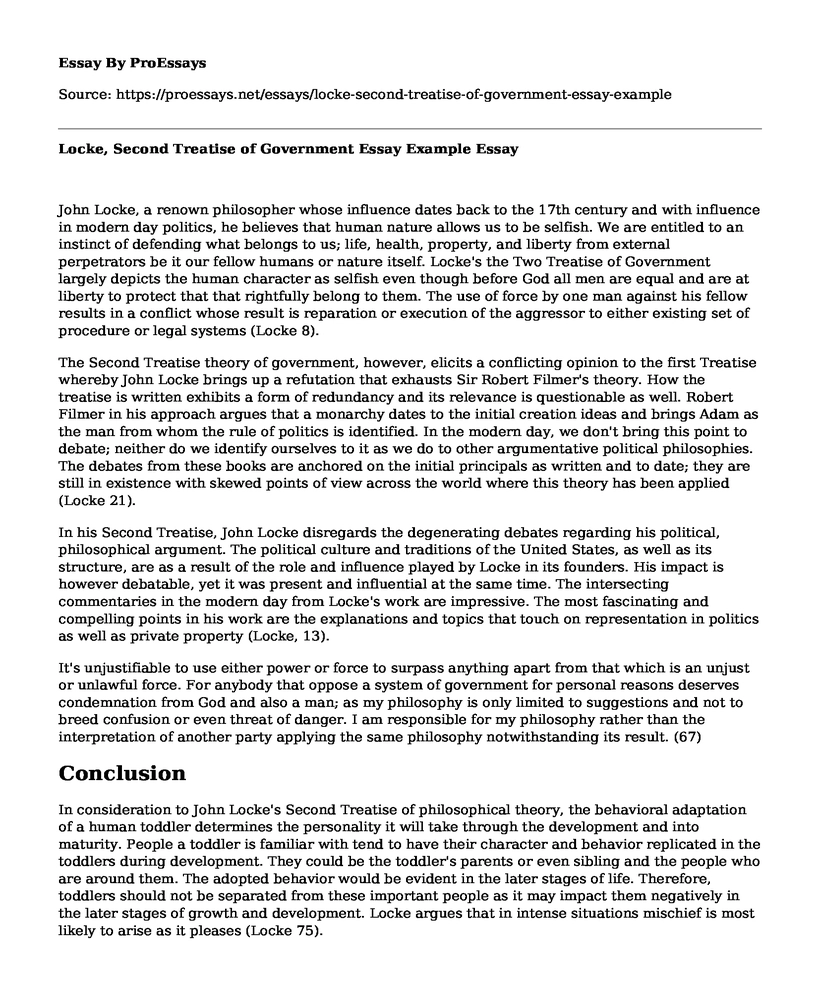John Locke, a renown philosopher whose influence dates back to the 17th century and with influence in modern day politics, he believes that human nature allows us to be selfish. We are entitled to an instinct of defending what belongs to us; life, health, property, and liberty from external perpetrators be it our fellow humans or nature itself. Locke's the Two Treatise of Government largely depicts the human character as selfish even though before God all men are equal and are at liberty to protect that that rightfully belong to them. The use of force by one man against his fellow results in a conflict whose result is reparation or execution of the aggressor to either existing set of procedure or legal systems (Locke 8).
The Second Treatise theory of government, however, elicits a conflicting opinion to the first Treatise whereby John Locke brings up a refutation that exhausts Sir Robert Filmer's theory. How the treatise is written exhibits a form of redundancy and its relevance is questionable as well. Robert Filmer in his approach argues that a monarchy dates to the initial creation ideas and brings Adam as the man from whom the rule of politics is identified. In the modern day, we don't bring this point to debate; neither do we identify ourselves to it as we do to other argumentative political philosophies. The debates from these books are anchored on the initial principals as written and to date; they are still in existence with skewed points of view across the world where this theory has been applied (Locke 21).
In his Second Treatise, John Locke disregards the degenerating debates regarding his political, philosophical argument. The political culture and traditions of the United States, as well as its structure, are as a result of the role and influence played by Locke in its founders. His impact is however debatable, yet it was present and influential at the same time. The intersecting commentaries in the modern day from Locke's work are impressive. The most fascinating and compelling points in his work are the explanations and topics that touch on representation in politics as well as private property (Locke, 13).
It's unjustifiable to use either power or force to surpass anything apart from that which is an unjust or unlawful force. For anybody that oppose a system of government for personal reasons deserves condemnation from God and also a man; as my philosophy is only limited to suggestions and not to breed confusion or even threat of danger. I am responsible for my philosophy rather than the interpretation of another party applying the same philosophy notwithstanding its result. (67)
Conclusion
In consideration to John Locke's Second Treatise of philosophical theory, the behavioral adaptation of a human toddler determines the personality it will take through the development and into maturity. People a toddler is familiar with tend to have their character and behavior replicated in the toddlers during development. They could be the toddler's parents or even sibling and the people who are around them. The adopted behavior would be evident in the later stages of life. Therefore, toddlers should not be separated from these important people as it may impact them negatively in the later stages of growth and development. Locke argues that in intense situations mischief is most likely to arise as it pleases (Locke 75).
Works Cited
Locke, John. Second treatise of government and a letter concerning toleration. Oxford University Press, 2016.
Locke, John. Second Treatise of Government: An essay concerning the true original, extent and end of civil government. John Wiley & Sons, 2014.
Cite this page
Locke, Second Treatise of Government Essay Example. (2022, Nov 28). Retrieved from https://proessays.net/essays/locke-second-treatise-of-government-essay-example
If you are the original author of this essay and no longer wish to have it published on the ProEssays website, please click below to request its removal:
- Wisdom Is Pursued: Socrates and Oracle Paper Example
- Ethics in Social Work Essay Example
- Research Paper on Climate-Change Policies for Low Carbon Transition
- Essay Sample on Social Security: The Foundation of Economic Security for Millions
- Analysis of Three Articles on Democracy: Schumpeter, Habermas & Rawls - Essay Sample
- Global Citizens Prefer Democratic Governments: Cross-National Study
- Essay Example on Psychology: APA Code of Ethics & Moral Obligations







